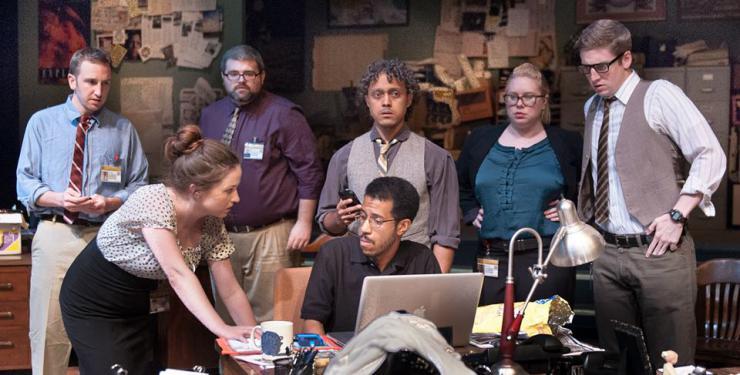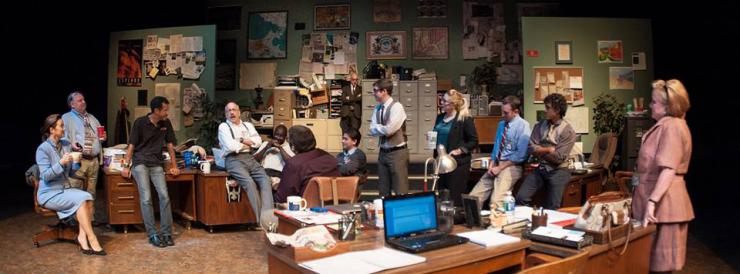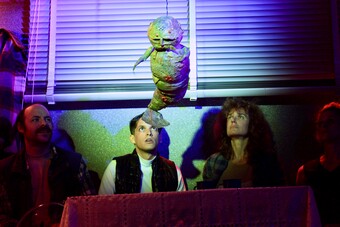Progress in Practice
At-Risk Industries in Dialogue
Abe Gannon, is a mid-fifties foul-mouthed, liquor-loving metro desk editor of an unnamed (but strongly implied) distinctive New Orleans daily newspaper. In the buzzing newsroom, this cannonball of a man bellows, curses, and drinks...a lot. With a fine-tuned ear and a passion for public knowledge, he’s extremely good at his job and very insistent in his ways. Abe is passionate about the industry he’s worked in for years—the romanticized industry of newsprint journalism—where reporters follow the paths of stories, no matter how long or uncertain they may be. They live under daily deadlines and long-term stakeouts. Like fishermen, they hope to catch the next big story. And in New Orleans, there is a sea of big stories, whether it be political corruption, cultural eccentricities, or progress or regress after a city-wrecking flood.

Photo by John B. Barrois
Abe is a character in A Truckload of Ink, a new play by Jim Fitzmorris, commissioned by The NOLA Project theater company. Abe’s newspaper has been in decline for some time: readers have been unsubscribing, news blogs are becoming more prevalent, and a corporate efficiency expert from out of town is sent into the newsroom to streamline the paper’s tried-and-true infrastructure.
And then, big news hits the newsroom: The daily paper will be downsized to printing only three days a week and will turn its focus to an online presence. The reporters find out by reading an article on The New York Times website.
Abe responds to the news of downsizing,
You see that? (Pointing at an iPhone) That’s the fucking problem! We’re not telling the stories about the world around us. We’re telling stories about what comes through our inboxes. It’s a newspaper, people, a narrative of a city! It is not an analog site for your blogs!
Abe goes on to rant, “The public trust is a great business model. A great business model until you abuse the public trust. Which is what we did!”
Abe Gannon is on to something. The major newspaper he works for used to serve a region through long form journalism, investigative pieces, and thoughtful narratives that record a gospel of the city. But news blogs began popping up. Citizen journalism became an embraced trend. And the executives of Abe’s newspaper panicked. They tried to mimic this new genre of online, informal journalism. They tried to make the stories efficient and streamlined. As a result, their industry got away from them. They lost their mission. Their newspaper became irrelevant. People began unsubscribing. And their print presence diminished.
To put this in perspective: Louisiana State University would have a daily newspaper, but the city of New Orleans would not.

Photo by John B. Barrois
The events of Abe Gannon’s newspaper are not completely fiction dreamed up by Fitzmorris. In May 2012, it was dramatically announced that New Orleans’ daily newspaper The Times-Picayune, would be downsized to printing three days a week. To put this in perspective: Louisiana State University would have a daily newspaper, but the city of New Orleans would not. In the fall of 2012, the voice of the city had its volume turned down. And this city has been adjusting to a part-time Times-Picayune (and a new full-time competitor, The Advocate) since.
I had the privilege of being the assistant director on A Truckload of Ink. As I followed the conversion of this new play from page to stage, I thought about its relation to regional theatre. Was this not a play about American regional theatre just as much as it was about American journalism?
American regional theatre was molded with the intention of providing communities throughout the nation with a professional theatre that can speak to them, for them. A theatre equipped with a company of professional, trained actors, playwrights, directors, and designers who could serve a community. To work a beat, if you will. Regional theatres could perform pieces and create new works that speak to the narrative of the public. Theatres could provide an arena for big ideas and even bigger questions. It was the intent for American theatre not to be defined by a few blocks in New York City, but by the integrity of the professional work coming from communities all over the nation.
Leaders of regional theatres have lost that inceptive intention: too often, they produce plays with efficient processes that will increase profit potential and provide a vehicle to a larger stage.
Does this put the American regional theatre at as much risk as American print journalism?
To requote the eccentric fictional editor, Abe Gannon,
We’re not telling the stories about the world around us. We’re telling stories about what comes through our inboxes. It’s a newspaper, people, a narrative of a city... The public trust is a great business model. A great business model until you abuse the public trust. Which is what we did!
Has the American regional theatre betrayed its audiences by not telling their stories, by not telling stories about the world around us? Has the mission of the not-for-profit regional theatre been soured in an attempt to keep up with the more efficient entertainment mediums of television, film, or the Internet? Is the institution of the regional theatre at risk?
The NOLA Project is vicariously asking these questions in the act of commissioning A Truckload of Ink. They’re answering these questions by producing it.
The NOLA Project is a company of slashers: actors/directors/designers/producers/writers/educators. Originally founded by a fresh group of NYU/Tisch graduates in 2007, the company has planted itself in New Orleans with an excellent critical and popular reputation for producing exceptional theatre. The company has now infused professionally trained artists from all over the country into their active ensemble. And whether they were born in New Orleans, New York, Chicago, or Los Angeles—all call New Orleans home.
In May 2012, Artistic Director, A.J. Allegra, was away on a family vacation when he saw online articles about The Times-Picayune being downsized. He read articles from publications all over the country on the topic... except—ironically—New Orleans’ The Times-Picayune, the subject of the story. Developments came out that Picayune reporters didn’t even know about the downsizing until they read about it on The New York Times website. Allegra spent his vacation reading accounts on how other national newspapers were buying the reporting staff drinks at local bars and longtime Picayune writers were giving impassioned speeches to a crowded newsroom in turmoil. Allegra recognized the dramatic potential.
He reached out to local playwright, Jim Fitzmorris, and commissioned a new play. Fitzmorris—a playwright with a frenetic mind, a taste for juicy plot, an appreciation of wit, and a deep love of New Orleans—has written many locally iconic plays about the city, its politics, its people, and its way of life.
Over the next year, Fitzmorris worked with Allegra and director, Beau Bratcher, in composing A Truckload of Ink. Fitzmorris engaged with the community, speaking with former and active Picayune reporters who were able to give him a precise account of the newsroom ecosystem. He crafted characters with specific local actors in mind, including one actor, Martin Covert, who worked as a reporter with the paper for thirty-two years before being let go because of the downsizing initiative.
Fitzmorris’ play orbits around a fictional paper, with characters inspired by well-known figures of The Times-Picayune. As Theodore Mahne, theatre critic of The Times-Picayune itself wrote in his review of the premiere production,
Far from a quickly “ripped from the headlines” piece, Fitzmorris presents a deeply insightful look at the newspaper, the changing face of the media industry, and its relationship with the city it covers. It is a very personal look at the people behind the bylines whose lives are affected by this paradigm shift.
Ink was produced at the University of New Orleans—a popular public commuter college, serving students from the entire Southeast Louisiana region. The college serves as a bold symbol of the public trust in New Orleans. In fact, the Chair of UNO’s Theater Department, David Hoover, played Metro Desk Editor, Abe.
By producing this play, The NOLA Project has demonstrated how the American regional theatre can increase its relevancy to save itself. While it may seem contradictory, innovation in the regional theatre is heavily reliant on the old ideals of the past: plays being conceived for communities, plots that get their cue from the world around them.
A Truckload of Ink combines over twenty-five artists to create a piece of theatre that speaks to a community, taking the events of The Times-Picayune and examining them through the lens of words, design, and performance. The company took the public anxiety floating in the humid New Orleans air about the loss of a daily paper, melded it into a well-written ensemble play, and mounted it on a stage and invited citizens to examine and participate in the outcome. Like newspapers, ensemble plays require a lot of people, a lot of time, and a lot of attention.
How did the community respond? Performance after performance, audiences stood on their feet to applaud the experience of the play. Night after night, the real-life experience of a community coping with the loss of an institution—an institution that had greeted them every morning with written updates, provocations, and investigations—was mirrored on stage.
At a post-show talkback, audience members stayed in the theatre to vent, commiserate, and share their experiences. Several former Times-Picayune reporters attended that talkback to speak about the “Abes” of their former newsroom. They provided insight into how betrayed they felt the day they found out their paper’s resources would be cut in half. One audience member expressed that she didn’t want to live in a city without a daily newspaper. Another long-time subscriber shared how she cried more about losing her daily paper than she did about losing her home to six feet of floodwater. One man described how he saw the value of print journalism in the commitment of citing on-the-record sources, and his concern for how unsourced news from New Orleans will influence the post-flood recovery on a local and national level. When the talkback was brought to a mandatory end, audience members flooded the thrust stage to speak with Fitzmorris, Allegra, and the acting ensemble. An energized audience rushing the stage, like at a rock concert, to talk about the play and the topics it explored with the artists, and with each other was a fantastic show of connectedness. They stayed because they cared, because they connected.
Like print journalism, live theatre is at risk of loosing its relevancy in a modern society of screens and pixels.
The NOLA Project—like all theatre companies—is a steward of an at-risk industry. Like print journalism, live theatre is at risk of loosing its relevancy in a modern society of screens and pixels. We can learn from the content of A Truckload of Ink: a warning that in our attempts to compete with the changing dynamic of modern entertainment, we must be cautious not to lose what makes regional theatre distinctive—a close, live connection to a real community. We can learn from the production of A Truckload of Ink: when theatre artists speak to the conscience of a real community in an artful way, we find our relevancy in the modern landscape.
One actor pondered aloud at the talkback, “How do we continue to fund the large staff of papers in this day and age?” An audience member responded, “How do we continue to fund plays like this?”








Comments
The article is just the start of the conversation—we want to know what you think about this subject, too! HowlRound is a space for knowledge-sharing, and we welcome spirited, thoughtful, and on-topic dialogue. Find our full comments policy here